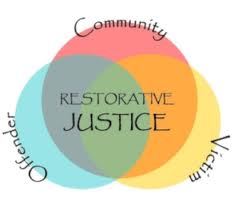The Teen Justice Panel helps neighborhoods deal effectively with first time youth offenders. A panel of local community volunteer teens meets with the young first time offender and his/her family to discuss the offense. The panel holds the youth accountable for their actions by requiring community service, educational programs, a panel fee, specific restitution if applicable, service on a panel for other youth, or other forms of reconciling with the community and/or victims.
How It Works:
1. Referral. Lincoln County Juvenile Department offers the offender the opportunity to go before the panel instead of heading to court. The Department will refer appropriate youth who have committed minor offenses such as, possession of alcohol, possession of less than 1 ounce of marijuana, possession of tobacco, theft, criminal mischief, curfew violations, or traffic offenses. In order to participate, the person must admit involvement in the offense and agree to meet with the panel.
2. The Panel Session. Panelists will be trained in conflict resolution, decision making, consensus building, and the juvenile justice system. The panel meets with the family and the youth together. The session is a voluntary and confidential process that can be stopped at any time. If the offense involves a victim, the victim is invited to meet with the panel to discuss the offense and their input may help the panel form the resolution. Panelists will be assisted in the process by an adult volunteer resolution coach.
3. The Resolution Contract. The panel does not decide guilt or innocence. The panel develops a program of community service, educational activities, or other forms of paying back to the community. Restitution (if needed) is handled by the Juvenile Department. Each resolution is customized to the offense and abilities of the individual. The youth contracts with the panel to complete the resolution within a specified time.
4. Completion. When the resolution is completed, the panel and the youth meet again to discuss his/her experience and the panel will recommend that no juvenile record be kept about the offense. If for any reason the youth fails to complete the resolution or commits another offense, the case is returned to the Juvenile Department for further action.
Benefits:
- The juvenile and his/her parents do not enter the justice system, with all of the stigmas, costs and detriments of a juvenile record attached.
- The juvenile has a chance to directly work off his/her offense through some positive community action.
- The juvenile and his/her parents witness the care and concern of their community.
- Victims, parents, Juvenile Department personnel, and police do not waste valuable time and money waiting in or outside of a courtroom, sometimes never to be called upon for their input.
- The juvenile and parents have an opportunity to access additional resources within their community.
- The Juvenile Department, and possibly Lincoln County School District, has another tool to deal with minor first-time offenses.
- Community panel members are educated by the cases they hear; problems of other local youth become clearer; they learn conflict resolution, decision-making skills and leadership skills; gain knowledge of the judicial system; and they experience the value of becoming more involved in their communities.
- Hopefully, the panels will provide information and input into the decisions of their community which involve all young people, not just those in trouble.
- Teen Justice Panels are customized to meet the needs of the community.
- The program will save Lincoln County money and other valuable resources.
Successes:
Nation-wide, panels collectively average a 90% completion rate for the contracts they enter with youth. The effectiveness of the Teen Justice Panel can also be measured by the intangible results. Youth are held accountable for their actions, are less likely to enter the criminal system, are prevented from using alcohol and other drugs. They receive career guidance, positive adult mentoring, and life skills.
Who are the Panelists?
All panelists live in the local community that they serve. The panels are not a part of the Juvenile Justice system, but rather a diversion from the system. Panels consist of four to six people. Panel members are responsible for a referred case from start to completion. The Panel Coach will oversee the case and report to a Teen Panel Coordinator. The Coordinator will be the only paid position in the program. The Lincoln County Juvenile Department will assist in finding and overseeing community service sites and resources.
Training:
Each community panelist receives formal training which includes:
- An overview of the Juvenile Justice System,
- Information about group process, conflict resolution, decision-making, and leadership,
- Information about abuse of alcohol and other drugs.
A Collaborative Effort:
The Teen Justice Panel Program is a collaborative effort:
- Volunteer teen panelists and adult resolution coaches
- Partnership Against Alcohol & Drug Abuse (PAADA)
- Lincoln County Juvenile Department
- Lincoln Commission on Children and Families
- Lincoln Community Dispute Resolution
- Local law enforcement
- District Attorney’s Office
- Juvenile and Circuit Court Judges
- Lincoln County School District
- Lincoln County Health and Human Services
Local governments, businesses, and service organizations also give the program invaluable support. All parts of the community benefit when the panels work well.
Administration:
PAADA, in conjunction with Lincoln County Commission on Children and Families and Lincoln Community Dispute Resolution, administers the program. They are responsible for recruiting, training, raising resources, public education, working with municipalities, and managing the program.
Technical assistance is provided by a PAADA Advisory Committee made up of representatives from agencies and groups involved in the collaborative effort.


